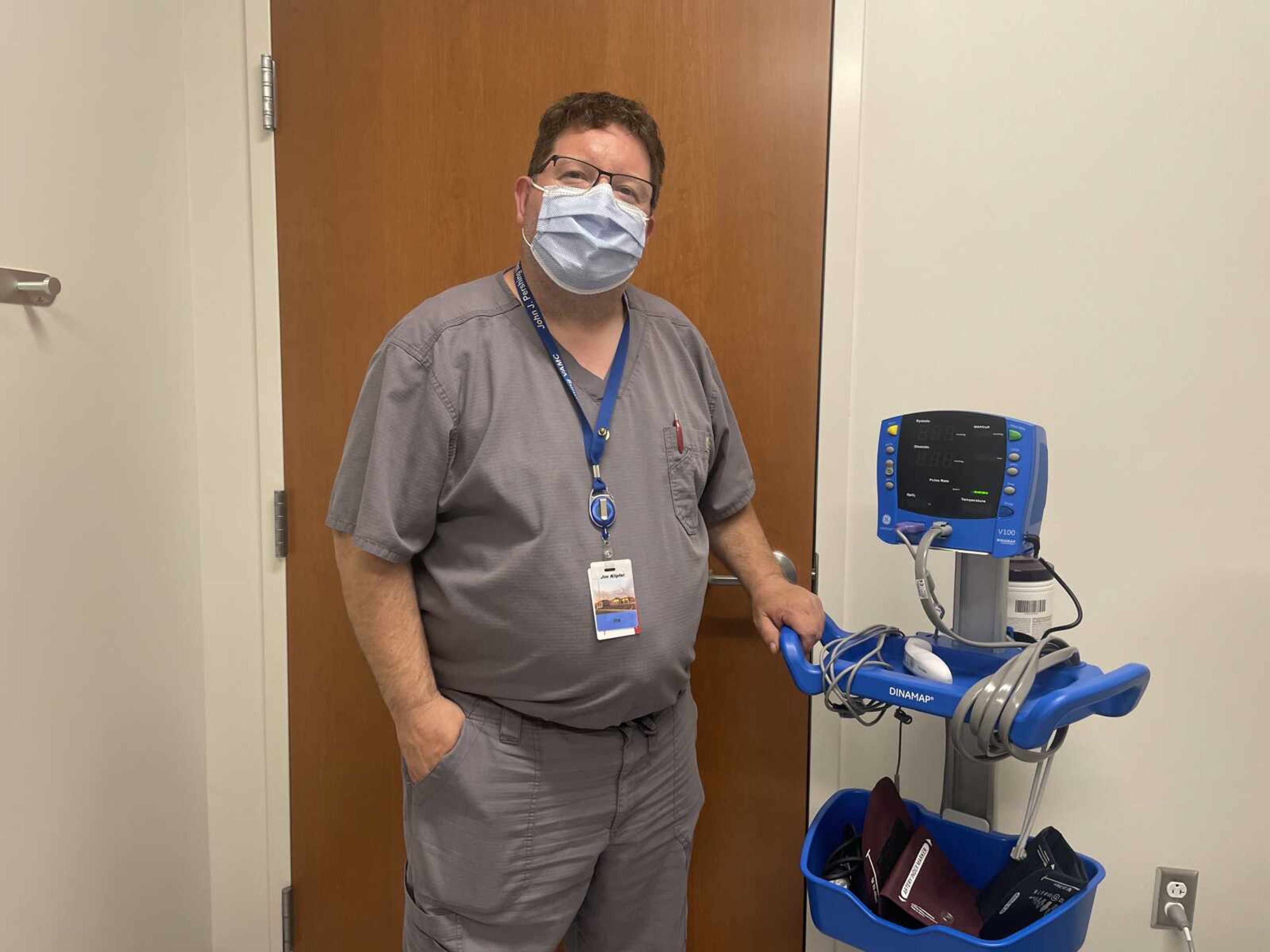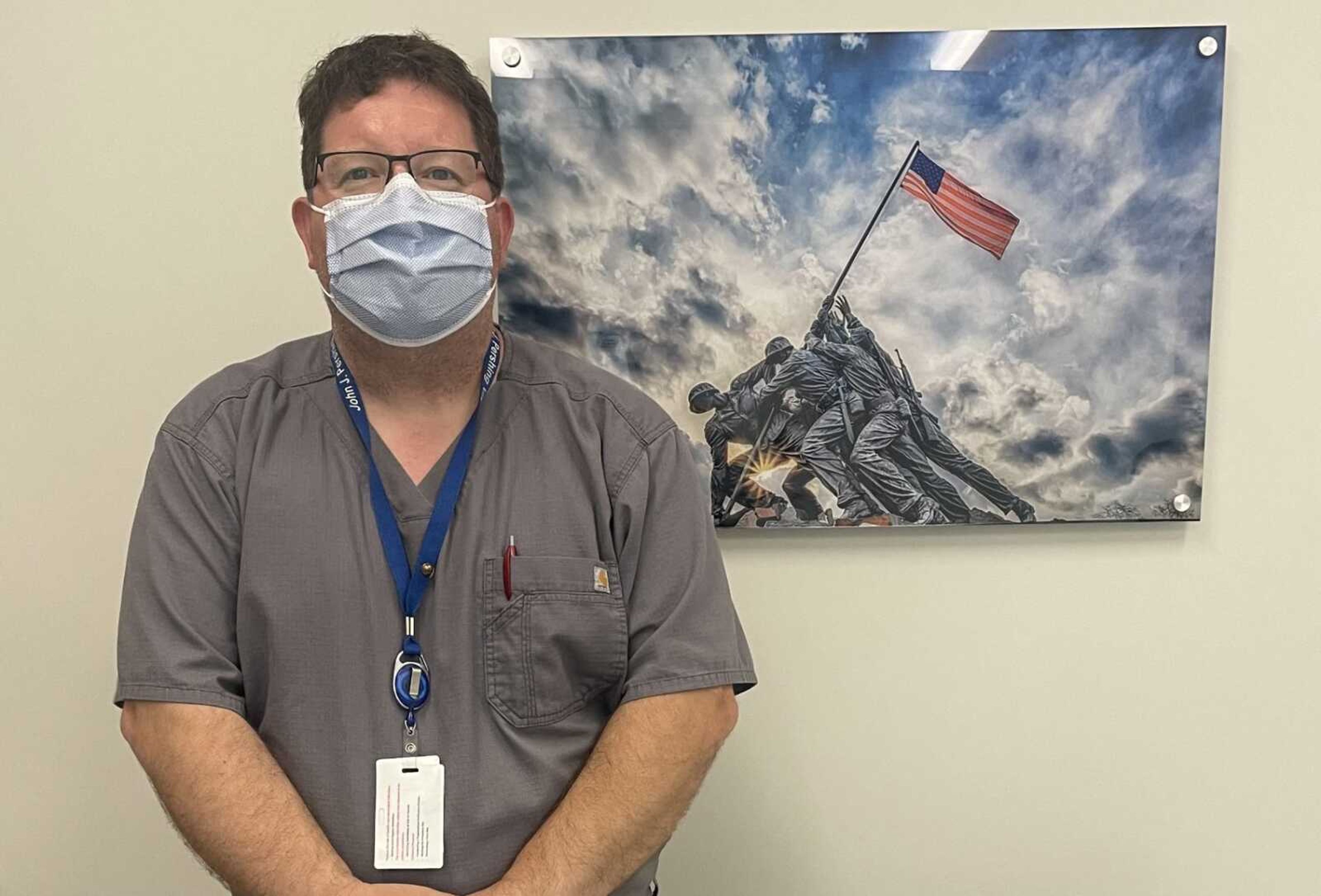National Nurses Week: Klipfel turns military training into VA nursing career
Benton, Missouri native Jim Klipfel has been a nurse in the Department of Veteran Affairs for the past 29 years. He currently staffs the Cape Girardeau medical center, and has worked for the VA in Cape since 2004. "It's been a long, long time," Klipfel said. "I've almost seen the greatest generation pass before my eyes. But we've still got a few! We've still got a few that I'm taking care of. They're very precious to me."...
Benton, Missouri native Jim Klipfel has been a nurse in the Department of Veteran Affairs for the past 29 years.
He currently staffs the Cape Girardeau medical center, and has worked for the VA in Cape since 2004.
"It's been a long, long time," Klipfel said. "I've almost seen the greatest generation pass before my eyes. But we've still got a few! We've still got a few that I'm taking care of. They're very precious to me."
He's not the kind of person who likes to focus on himself, and he doesn't like to boast, but Klipfel agreed to offer a human face for an often misunderstood profession. Klipfel said he wanted to give people a better perspective of "what used to be a predominantly female occupation."
Back in 1992, when Klipfel first entered nursing, there weren't many male nurses.

"There were only three other males in the LPN [Licensed Practical Nurse] program, out of over 30 people," Klipfel recalled.
Many who go into nursing have family in the industry, as nurses, technicians or in other areas. Klipfel, however, had no such family contacts. His parents, who worked a small farm, had assets, but not much money to put him through college.
"With a minimum-wage job for $3 or something per hour, I didn't think I'd go very far in college," Klipfel said. "The medical profession was distant to me then. I didn't know anybody that went into it. No friends, family or anybody really. What got me into it was kind of a fluke."
The feeling of aimlessness is familiar to many high school students, and Klipfel recalled "not knowing what to do" after he graduated.
He found direction and financial support in his decision to join the Army reserves. As it happened, the only outfit close to home was a medical unit. Klipfel put college on hold to attend basic training in Fort Knox, Kentucky, and then entered his military service. A captain he served with, Terry Crass, became a coworker he still works with today.
"Me and Terry have known each other for quite some time. He's one of our senior RNs [registered nurses]. He's actually probably one of the main reasons I went to nursing school," Klipfel said.
Still, when Klipfel first met Crass, he "knew nothing about nursing other than that most nurses were females."
Seeing military men going into nursing, Klipfel explained, opened his eyes.
"The dots started connecting," Klipfel said.
Suddenly, he saw a way to start a career without leaving the military. He could begin his studies without leaving his unit. At least, that's what he thought.
Off to war
Desert Storm changed the calculus, and Klipfel was deployed to the Persian Gulf, along with about half his unit.
A sergeant overseeing that deployment first suggested Klipfel enroll in a military program which would allow him to study nursing on the military's dime.
"The military would pay for everything. Totally. Lock, stock and barrel," Klipfel recalled. "They also paid my salary while I attended. I tell ya, going to the military, getting all that experience on both sides, it set my life in the right motion. Because once I got my LPN [Licensed Practical Nurse] through the military's program, I went right into clinical rotation."
In his Army medical unit, Klipfel was not a nurse but a "medical supply specialist." He worked in a warehouse, supplying the front line.
"We worked tirelessly. Those were long days, about six months," Klipfel remembered. "You'll know from the history books how that went down. We went in and took care of business without much resistance. Luckily, that operation went from a very nasty situation to the best case scenario for us."
Stateside, Klipfel put his nursing license to good use. He went from moving medical supplies through a desert outpost to actually using them.
VA work
Klipfel worked in chemotherapy, same-day surgery and "med-surg" (medical/surgical floor) in various branches of the VA. He finally decided to return closer to his native Southeast Missouri.
Klipfel found happiness in his stable career, but it was not one without difficulties.
"I know patients not just by their ailments," Klipfel said. "I also get to know their psychological needs. Sometimes, the job isn't high tech. It's me sitting down to talk with you and figure things out. Not everybody likes that approach. There's always a few that don't. But many patients ask for me. Sometimes, that conversation matters more to the patient than talking to their physician about their ailment."
When it becomes a relationship based on emotional support and comfort, Klipfel said he is happy to provide it. Klipfel doesn't hide behind his happy exterior, though.
"The hardest part of the job is giving someone all of your efforts, and then not being able to save them. We are with our patients' in life. Sometimes, that means being with them at death. Sometimes, that means being there for them when there's nothing you can do to save them," Klipfel said. "You can be supportive, you can do things for them but, unfortunately, it always makes you feel a little bit like you've failed. We're here to ensure their wellness. ... It's just sad when it gets like that. That, to me, is hard."
Klipfel made a distinction between emotional challenges and the technical ones.
"Technically speaking, yeah, there are things that get harder as you get older, and your learning capacity decreases. But that's nothing. We learn that stuff. Seeing people passing, that never stops being hard. Having to stand by the wayside, never stops being hard. That, to me, is the hardest part. Getting to know the patient really is everything. It's the best part of the job. It's also the hardest part."
Klipfel had difficulty admitting plans to retire in five years. He only called it a "possibility."
"Whether I will or not, I don't know. We shall see. I mean, I'm 51 years old and a veteran. I might be here one of these days, struggling with the same health problems, being managed by a new and younger generation of caregivers that I hope, maybe, will have learned something from me," Klipfel speculated. "It depends on your own spiritual belief, but I believe this whole lifecycle is not a cycle of sadness. I believe we're all destined for something better than this world. We're all gonna come to that final end and what's there is gonna be there."
Connect with the Southeast Missourian Newsroom:
For corrections to this story or other insights for the editor, click here. To submit a letter to the editor, click here. To learn about the Southeast Missourian’s AI Policy, click here.










